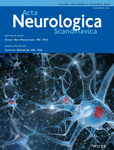Hyposmia in a simple smell test is associated with accelerated cognitive decline in early Parkinson's disease
Funding information
The Norwegian ParkWest study is partly funded by the Research Council of Norway (grant#177966), the Western Norway Regional Health Authority (grant# 911218) and the Norwegian Parkinson Research Foundation.
Abstract
Objectives
Olfactory dysfunction has been related to cognitive deficits in Parkinson's disease (PD), but evidence is conflicting and little is known about the relationship between these symptoms in early PD. Our objective was to study the association between smell deficits measured with a simple odor identification test at diagnosis of PD and the subsequent risk of cognitive decline.
Materials & methods
One hundred and ninety two PD patients from a population-based study were examined at time of diagnosis, before initiation of dopaminergic treatment, with follow-up of 177 patients after 3 years, 162 patients after 5 years and 146 patients after 7 years. Cognitive function was assessed repeatedly with tests of global cognition, verbal memory, visuospatial abilities, processing speed, and executive function. Olfactory function was tested with a simple odor identification test at baseline. Associations between outcome measures and hyposmia were assessed by linear mixed effects models.
Results
After 7 years, there were significant differences in global cognition (B: 1.96 (95% CI: 0.68, 3.24), P = 0.0031), verbal memory including immediate recall (B: 5.36 (95% CI: 2.04, 8.67), P = 0.0018) and delayed recall (B: 1.55 (95% CI: 0.51, 2.59), P = 0.0041) and word reading speed (B: 6.90 (95% CI: 2.17, 11.63), P = 0.0048) between hyposmic and normosmic PD patients.
Conclusions
The decline of cognitive function in early PD is more rapid in patients with hyposmia at diagnosis, compared to normosmic ones. A simple smell test may contribute to identify patients at risk of accelerated decline in global cognition, verbal memory, and processing speed within the first 7 years from diagnosis.
CONFLICTS OF INTEREST
Kristian Varden Gjerde, Bernd Müller, Geir Olve Skeie, Jörg Assmus, Guido Alves, and Ole-Bjørn Tysnes report no disclosures relevant to the manuscript.




